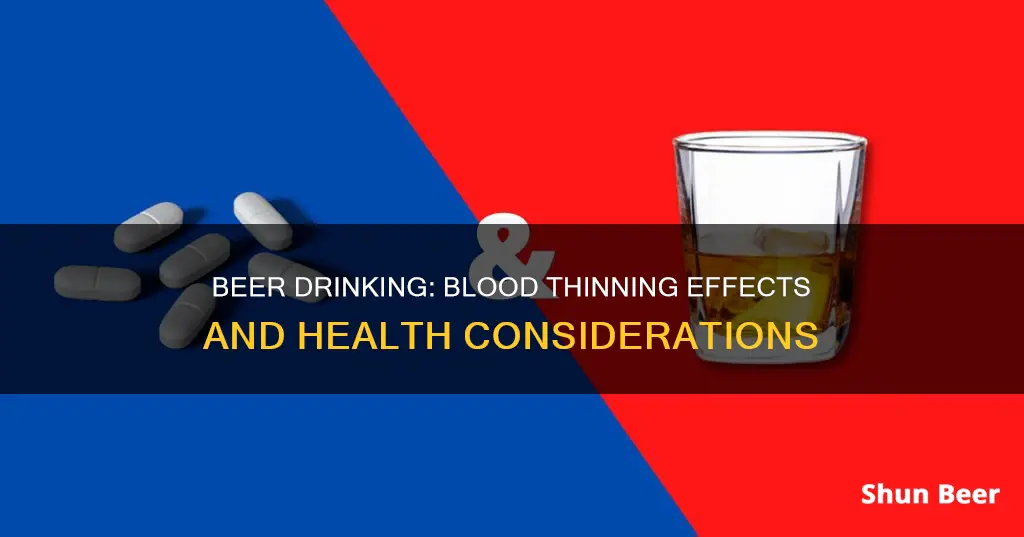
Alcohol, including beer, is known to thin the blood, which can be beneficial in preventing blood clots that may lead to cardiovascular events such as heart attacks and strokes. However, excessive alcohol consumption can increase the risk of internal bleeding and compromise healing from injuries. Therefore, it is important to drink in moderation and consult with a healthcare professional, especially for those taking blood-thinning medications.
| Characteristics | Values |
|---|---|
| Effect on blood | Alcohol thins the blood by reducing its natural ability to form clots. |
| Effect on platelets | Alcohol reduces the number of platelets in the blood and makes the remaining platelets less sticky. |
| Risk of blood clots | Alcohol may increase the risk of blood clots. |
| Risk of bleeding | Alcohol increases the risk of bleeding, especially when combined with blood thinners. |
| Effect on blood pressure | Alcohol increases blood pressure. |
| Cardiovascular issues | Heavy drinking is associated with an increased risk of high blood pressure, cardiomyopathy, and arrhythmias. |
| Liver function | Alcohol can affect liver function and may lead to liver diseases such as fatty liver, alcoholic hepatitis, and cirrhosis. |
| Immune system | Chronic alcohol use weakens the immune system. |
| Cancer risk | Long-term heavy drinking is linked to an increased risk of several cancers, including liver, breast, oesophagus, and mouth cancers. |
| Neurological effects | Alcohol can lead to cognitive impairment, memory loss, and an increased risk of neurological disorders such as dementia. |
| Mental health | Alcohol abuse is associated with an increased risk of mental health issues, including depression and anxiety. |
What You'll Learn

Beer and blood thinners: a dangerous combination
Beer, like other alcoholic drinks, can thin the blood. This is because alcohol affects the process of blood coagulation. When someone is injured, blood cells called platelets rush to the site of the injury and stick together to form a blood clot, which stops the bleeding. Alcohol reduces the number of platelets in the blood and makes the platelets less sticky, so they are less able to stick together and form a clot. This means that even minor injuries can lead to excessive bleeding.
Blood thinners are medications that are prescribed to people at high risk of dangerous levels of blood clotting. They work in a similar way to alcohol, by thinning the blood and preventing blood clots from forming.
Combining beer and blood thinners can be dangerous because it can lead to excessive thinning of the blood. This can cause excessive bruising and bleeding, even from small injuries. Internal bleeding, in particular, can be very dangerous as it is difficult to detect. Thin blood can also make it harder for wounds to heal.
If you are taking blood thinners, it is important to limit your alcohol intake. One drink on occasion is not likely to cause problems, but moderate to heavy drinking is dangerous when combined with blood thinners. For women, this means no more than one drink per day, and for men, it means no more than two drinks per day. If you are taking blood thinners, you should speak to your doctor about how much alcohol is safe for you to drink.
Beer and Braces: What You Need to Know
You may want to see also

How does beer thin the blood?
Beer, like other forms of alcohol, can thin the blood. This is because alcohol affects the process of blood coagulation, or clotting. When a person is injured, blood cells called platelets rush to the site of injury and stick together to form a blood clot to stop the bleeding. However, alcohol reduces the number of platelets in the blood and makes the existing platelets less sticky, thereby hindering their ability to clump together and form a clot.
In addition to reducing the number of platelets, alcohol also interferes with blood cell production in the bone marrow. This means that the body produces fewer platelets, further reducing the blood's ability to clot.
The effects of alcohol on blood clotting can be dangerous, especially for people who are already on blood-thinning medications. The combination of alcohol and blood thinners can lead to excessive bruising and bleeding, including internal bleeding, which can be difficult to detect. Therefore, it is important for individuals taking blood thinners to limit their alcohol intake and consult with their healthcare providers.
While low to moderate alcohol consumption may have some potential health benefits, such as reducing the risk of clots, the risks associated with drinking alcohol, especially in excess, outweigh these potential benefits. Heavy drinking is associated with an increased risk of high blood pressure, cardiovascular issues, liver disease, and other serious health problems. Therefore, it is important to consume alcohol in moderation or avoid it completely if it conflicts with medications or negatively impacts one's health.
Mixing Beer and Nyquil: Safe or Risky?
You may want to see also

Beer and blood clots: what you need to know
Beer, like other alcoholic drinks, can affect the blood's ability to clot. This is because alcohol interferes with the production and function of platelets, the blood cells responsible for initiating the clotting process. When you drink beer, it can reduce the number of platelets in your blood and make the remaining platelets less "sticky," compromising your blood's ability to form clots.
If you have a blood clotting disorder or are taking blood thinners, drinking beer can be risky. Both alcohol and blood thinners thin the blood, so consuming beer while on these medications can amplify the blood-thinning effect. This heightened blood thinning increases the risk of bleeding, even from minor injuries or cuts. Therefore, it is crucial to consult your healthcare provider if you are taking blood thinners and want to consume beer or any other alcoholic beverage.
Interestingly, while beer and other alcoholic drinks can thin the blood, excessive alcohol consumption has also been linked to an increased risk of blood clots. Daily drinking of significant amounts of alcohol can increase platelet aggregation and reactivity, which are factors that contribute to the formation of blood clots. Therefore, heavy drinking may increase your risk of developing blood clots, high blood pressure, and cardiovascular conditions.
It is generally recommended to avoid consuming beer or any other alcoholic beverage before surgery. Research suggests that alcohol may thin the blood, and combining this effect with the use of anesthesia and other medications during surgery can be dangerous. Additionally, heavy alcohol use has been linked to increased surgical complications and higher dose requirements for general anesthesia.
If you are taking blood thinners, it is important to consult your doctor about safe alcohol consumption. In general, for individuals taking blood thinners, extreme moderation is advised: one drink per day for women and up to two drinks per day for men. However, this may vary depending on your specific health condition and medication plan, so personalized guidance from your healthcare provider is essential.
Homebrew Beer Legality for Underage Drinkers
You may want to see also

Is beer bad for your blood pressure?
Beer contains alcohol, and alcohol can have a complex effect on blood pressure.
Short-term effects
Consuming three or more alcoholic drinks in a single sitting can cause a temporary increase in blood pressure. This effect is not harmful to people with healthy blood pressure. However, frequent binge drinking can lead to long-term changes in blood pressure.
Long-term effects
Long-term, excessive drinking can decrease your heart’s ability to function correctly and lead to high blood pressure. It can also increase your risk of cardiovascular events such as a heart attack or stroke.
Alcohol and blood pressure medication
If you are taking blood pressure medication, it is best to avoid alcohol. Alcohol can interfere with the absorption and metabolism of some medications, including blood pressure drugs. This interference may impact the intended therapeutic effects of the medication.
The American Heart Association (AHA) advises that individuals should limit their alcohol consumption to no more than two drinks daily for males and one drink per day for females.
Alcohol use disorder
If you are unable to stop or control your alcohol consumption despite negative consequences, you may have Alcohol Use Disorder (AUD). AUD is a medical condition that can be treated with medications and behavioural therapies.
Kratom and Beer: Safe Mix or Risky Cocktail?
You may want to see also

How much beer is too much?
Beer, like other forms of alcohol, can thin your blood. This is because alcohol prevents blood from clotting, compromising the blood's ability to stop bleeding when an injury occurs.
The amount of beer that is considered too much depends on various factors, including age, gender, and individual health conditions. According to the Mayo Clinic, moderate drinking is defined as follows:
- For women of all ages: up to one drink per day
- For men aged 65 or older: up to one drink per day
- For men younger than 65: up to two drinks per day
Exceeding these guidelines is considered heavy drinking, which can lead to a rebound effect, increasing the risk of bleeding even after stopping drinking.
Additionally, those on anticoagulant medications (blood thinners) should limit their alcohol intake to one standard drink per day. Combining blood thinners and alcohol can lead to dangerous levels of blood thinning, increasing the risk of excessive bruising and bleeding, including internal bleeding.
Heavy drinking, especially over multiple consecutive days, can also lead to long-term detrimental effects on blood and heart health. It can increase the risk of high blood pressure, heart disease, and cardiovascular events such as heart attacks and strokes.
Therefore, it is important to drink in moderation and consult a healthcare provider if you have specific health concerns or are taking blood-thinning medications.
Drinking Beer and Riding a Bike: Is It Safe?
You may want to see also
Frequently asked questions
Yes, drinking beer can thin your blood. Alcohol, in general, can affect the blood's ability to clot, which can be beneficial in preventing certain types of strokes caused by blockages in blood vessels. However, drinking large quantities of alcohol can increase the risk of bleeding-type strokes.
Alcohol interferes with the blood clotting process by reducing the number of platelets in the blood and making the existing platelets less sticky. Platelets are the parts of the blood that initiate clotting when an injury occurs.
Yes, combining alcohol with blood thinners can amplify the blood-thinning effect, increasing the risk of bleeding, especially with internal bleeding. It can also affect the liver's ability to metabolize medications effectively and may interfere with the absorption of certain medications.
Moderate drinking is typically defined as up to one drink per day for women and up to two drinks per day for men. One drink is generally equivalent to a 12-ounce beer with 5% alcohol, a 5-ounce glass of wine, or 1.5 ounces of liquor.







